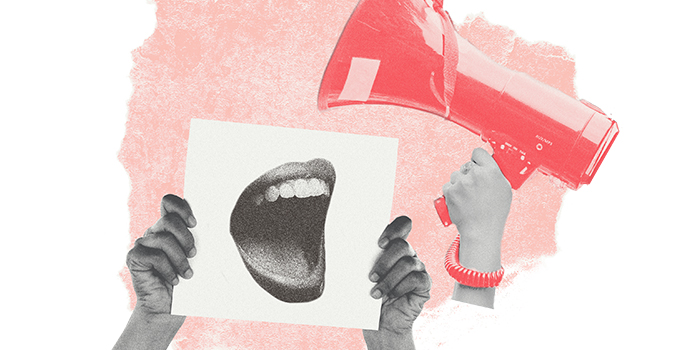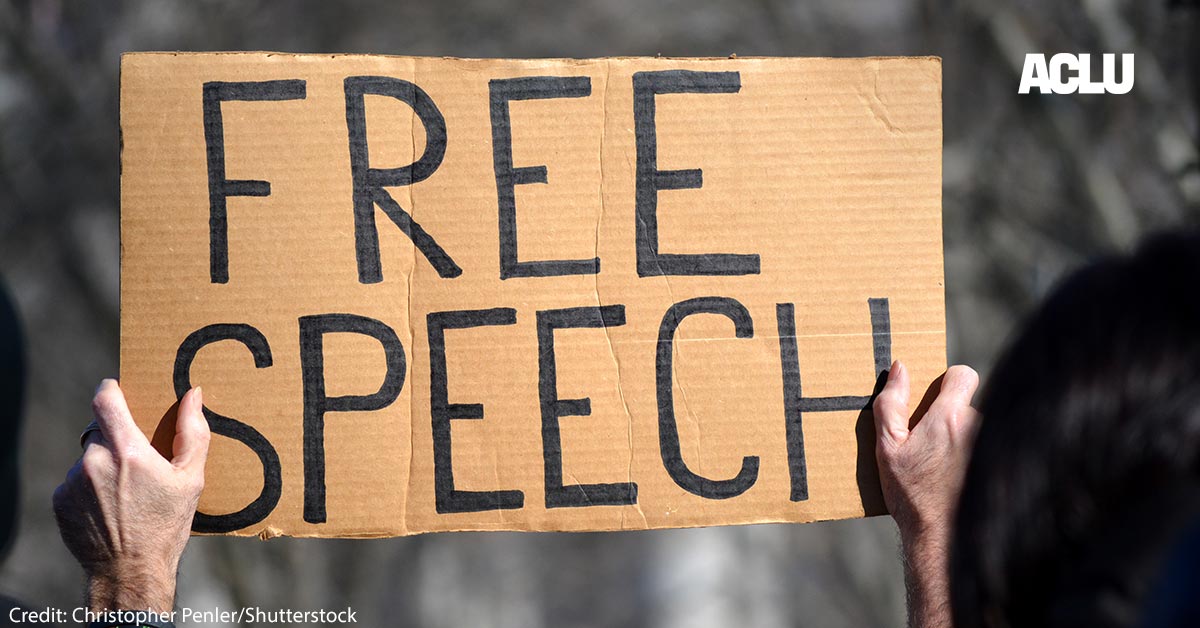
For more than 100 years the American Civil Liberties Union has defended the right to free speech – no matter the speaker, and regardless of whether we agree with their views.
The defense and protection of free speech and expression span many forms and issues at the ACLU. In the last year, alone, it has included efforts to actively oppose book bans; represent educators fighting classroom censorship aimed at suppressing critical race perspectives; defend protesters responding to police shootings or overseas wars; protect the ability of Indigenous students to wear tribal regalia at their graduation ceremonies; and fight against retaliatory arrests for protected speech.
While the faces of the free speech movement continue to change, the significance of defending free speech remains unchanged. This work lies at the heart of the ACLU’s core principles and values.
Why the ACLU Represented the NRA
On March 18, the ACLU appeared before the US Supreme Court to argue another free speech case of great significance. In this case, the ACLU represented the National Rifle Association (NRA) against government overreach and censorship. Some may have wondered why the ACLU was representing the NRA, since the ACLU clearly opposes the NRA on gun control and the role of firearms in society. In fact, we abhor many of the group’s goals, strategies, and tactics. So, the reality that we have joined forces, notwithstanding those disagreements, reflects the importance of the First Amendment principles at stake in this case.
The ACLU made the decision to represent the NRA in this case because we are deeply concerned that if regulators can threaten the NRA for their political views in New York state, they can come after the ACLU and allied organizations in places where our agendas are unpopular.
If reelected, President Trump has already promised to use the power of the government to go after his political adversaries In a second Trump administration, opposition from the ACLU and its allied organizations will be top of mind for political leaders who may seek to go after their rivals the way New York targeted the NRA. The principal issue at stake in this case is one in which the ACLU deeply believes: preventing government blacklists of advocacy groups. Indeed, the timing couldn’t be better for drawing a bright line that would help bind a future Trump administration and other government officials who misuse their power.
In this case, the ACLU argues that Maria Vullo, New York’s former chief financial regulator, threatened to use her regulatory power over banks and insurance companies to coerce them into denying basic financial services to the NRA and, in Vullo’s own words, “other gun promotion” groups. The ACLU argues that coercing private parties to blacklist the NRA because of its advocacy violates the First Amendment, just as punishing the group directly for its “gun promotion” views would. And if New York can do this to the NRA, Texas or Florida could use the same tactics against groups advocating immigrants’ rights or the right to abortion.
The NRA has a right, like all other advocacy organizations, to pursue their mission free from reprisals by government officials who disagree with its political viewpoint. The government should not be able to evade the Constitution by doing indirectly what it plainly cannot do directly. History has, consistently, underscored the importance of this protection.
Nevertheless, we’ve faced criticism of our representation of the NRA on the theory that even if the NRA wins in this Supreme Court case, officials will still try to stifle the speech of people on the left, and courts will side with them. These critics are correct in one sense—those in power have an unfortunate tendency to try to stifle the speech of those they disagree about, and we will certainly continue to bring new cases to stop them. But the critics are wrong about the impact of the precedents we win, especially at the Supreme Court. People of every ideological stripe benefit with every decision vindicating the right to freedom of speech.
Why It's Important to Defend Speech We Detest
When we defend clients with positions with which we disagree, or even abhor, it’s because we are defending values crucial to the work of civil rights advocates in the past and present. These values include doctrines that protect our rights—at the local, state, and federal level—to join economic boycotts, hold protests, and publicly dissent. In fact, a significant amount of the ACLU’s modern day First Amendment advocacy work is predicated on principles stemming from landmark civil rights legal victories of the 1960s and 70s.
Take one of our most controversial cases, which is also one of the most important cases in the entire First Amendment canon—our defense of the Ku Klux Klan. In 1969, Klan member Clarence Brandenburg addressed a rally held in Ohio where he called for “revenge” against the government and Black individuals. He was convicted for violating the state’s Criminal Syndicalism law, which prohibited speech that “advocate[d]…the duty, necessity, or propriety of crime, sabotage, or unlawful methods of terrorism as a means of accomplishing industrial or political reform.”
The ACLU represented Brandenburg at the Supreme Court, which reversed his conviction. The Court ruled that Brandenburg’s speech was protected by the First Amendment, and that the government can make it a crime to advocate illegal conduct only “where such advocacy is directed to inciting or producing imminent lawless action and is likely to incite or produce such action.”
Brandenburg’s speech was reprehensible. But in preserving his First Amendment rights, the ACLU helped establish critical protection for all dissidents’ and activists’ speech. Before Brandenburg, governments had regularly charged their critics with advocating illegal activity. The Brandenburg precedent has been used to defend all kinds of political speech; indeed, today the ACLU is applying the decision in a Supreme Court case defending civil rights activist DeRay Mckesson, who took part in a Black Lives Matter protest in Louisiana.
Simply put, the right to speak freely applies to everyone. Otherwise, any elected official would be able to decide whose speech is acceptable, “safe,” or politically palatable. That is why we defend speech we hate. It’s why, in 1978, the ACLU represented a neo-Nazi group that sought to demonstrate in Skokie, a Chicago suburb with a substantial Jewish population, including many survivors of the Holocaust. Notwithstanding the odious views of the protesters, we believed that once government officials are empowered to block demonstrations because they disagree with their message, the right to protest would be illusory. The Supreme Court agreed, and that decision ensures that city, state, and federal officials cannot suppress protests because they disapprove of their message.
The power to censor the neo-Nazis would have opened the door to censoring any protester, including civil rights activists or anti-war protesters. The ACLU’s position in this case was famously controversial and Aryeh Neier, the ACLU’s executive director in the 70s and a Jewish refugee from Nazi Germany, withstood withering criticism. But it was the right thing to do.
Why the First Amendment Applies to Everyone, Not Just Our Friends
The ACLU knew in the past, as we recognize now, that if the First Amendment protected only popular ideas, it would serve little purpose. If we do not take a principled stand on behalf of those with whom we disagree, we weaken our case the next time we defend those fighting for the values we share. At our core, the ACLU believes that rights and liberties are universal and “indivisible” – meaning they attach to all people, not just our friends.
Our mandate to advance all rights and liberties for all people was forged more than 100 years ago when we combatted political repression against dissidents, immigrants, workers, and other so-called radicals. Over the years the ACLU has defended the free speech rights of countless individuals and groups with which we disagree. We defended their speech rights—despite our disagreements—because we believe in free speech, and because we realize that once you chip away at one person’s rights, everyone’s rights are at risk.
Defending speech we hate is admittedly a controversial part of our mandate. Some of our allies and supporters don’t always agree with this stance. In fact, there are even some ACLU staff, leaders and volunteers who believe that defending speech we hate does more harm than good. Some believe we shouldn’t use our limited resources defending individuals and causes with whom we disagree. Reasonable people can—and always will—disagree on the ACLU’s stance, including our own staff. Yet this is what we have done for over a century, and I respectfully believe it’s the right thing to do—for free speech and for the ACLU.
Ours is an organization that increasingly reflects all of America. We celebrate our growing diversity, just as we embrace the dissent and debate that attend it. Our commitment to free speech starts at home and extends to dissent within our ranks. Dissent and debate are healthy for society—and for a civil liberties organization. This principle has long been the lifeblood of the ACLU. And it is that commitment that underlies our defense of the NRA’s free speech rights at the Supreme Court.


Comments
Post a Comment